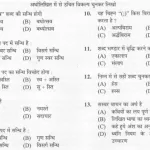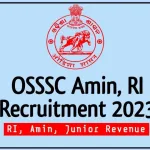The Bihar Staff Selection Commission (BSSC) Inter Level Examination is a significant opportunity for candidates aiming to secure government positions in Bihar. Understanding the detailed syllabus and exam pattern is crucial for effective preparation. Below is a comprehensive guide to the BSSC Inter Level Syllabus for the year 2025.
Introduction to the BSSC Inter Level Syllabus 2025
The BSSC Inter Level Examination is designed to assess a candidate’s proficiency across various subjects, ensuring they possess the necessary knowledge and skills for roles in the state’s administrative framework. The 2025 syllabus encompasses a range of topics divided into distinct sections, each targeting specific competencies.
Detailed Breakdown of the Syllabus
1. General Studies
This section evaluates a candidate’s awareness of current events and understanding of various facets of Indian and Bihar-specific contexts. Key areas include:
- Current Affairs: National and international events, awards, sports, and significant happenings.
- History: In-depth knowledge of Indian history, with a special focus on Bihar’s historical events and contributions.
- Geography: Physical features, climate, and demographic details of India and Bihar.
- Economy: Economic development, planning, and key initiatives in India and Bihar.
- Polity: Constitutional features, political systems, and administrative structures.
- Culture: Arts, literature, traditions, and cultural heritage of India and Bihar.
Skills Developed: Enhanced understanding of socio-economic and political scenarios, critical analysis of current events, and appreciation of cultural diversity.
2. General Science and Mathematics
This section tests foundational knowledge in science and mathematics.
General Science:
- Physics: Mechanics, thermodynamics, electricity, magnetism, and optics.
- Chemistry: Atomic structure, chemical bonding, periodic table, and chemical reactions.
- Biology: Cell biology, genetics, human physiology, and ecology.
Mathematics:
- Arithmetic: Number systems, percentages, ratios, time and work, profit and loss.
- Algebra: Equations, quadratic equations, and progressions.
- Geometry and Trigonometry: Properties of shapes, mensuration, and trigonometric identities.
- Statistics: Data interpretation, measures of central tendency, and probability.
Skills Developed: Analytical thinking, problem-solving abilities, and quantitative aptitude.
3. Mental Ability and Reasoning
This section assesses logical reasoning and cognitive abilities. Key topics include:
- Verbal Reasoning: Analogies, coding-decoding, series completion, and syllogisms.
- Non-Verbal Reasoning: Pattern recognition, spatial visualization, and puzzles.
- Logical Analysis: Problem-solving, decision-making, and analytical reasoning.
Skills Developed: Enhanced logical thinking, decision-making skills, and the ability to analyze complex scenarios.
4. General Hindi
This section evaluates proficiency in the Hindi language. Areas covered include:
- Grammar: Syntax, sentence structure, verb forms, and grammatical rules.
- Vocabulary: Synonyms, antonyms, idioms, and phrases.
- Comprehension: Understanding and interpreting written passages.
- Composition: Essay writing, letter writing, and précis writing.
Skills Developed: Improved language proficiency, effective communication, and comprehension abilities.
Examination Pattern
Understanding the exam pattern is vital for strategic preparation.
Preliminary Examination
- Total Questions: 150 multiple-choice questions.
- Subjects: General Studies, General Science and Mathematics, Mental Ability.
- Marks per Question: 4 marks.
- Total Marks: 600.
- Duration: 2 hours and 15 minutes.
- Negative Marking: 1 mark deducted for each incorrect answer.
Main Examination
- Paper I: General Hindi
- Questions: 100.
- Marks: 400.
- Duration: 2 hours and 15 minutes.
- Paper II: General Studies, General Science and Mathematics, Mental Ability
- Questions: 150.
- Marks: 600.
- Duration: 2 hours and 15 minutes.
Note: Both papers consist of multiple-choice questions with a negative marking of 1 mark for each incorrect response.
Recommended Study Materials
To aid your preparation, consider the following resources:
- General Studies: “Lucent’s General Knowledge” and “Manorama Yearbook” for comprehensive coverage.
- General Science: NCERT textbooks (Classes 6-10) for fundamental concepts.
- Mathematics: “Quantitative Aptitude” by R.S. Aggarwal for practice questions.
- Mental Ability: “A Modern Approach to Verbal and Non-Verbal Reasoning” by R.S. Aggarwal.
- General Hindi: “Samanya Hindi” by Lucent’s Publication for grammar and language skills.
Preparation Tips
- **Structured
FAQ for Bihar SSC Inter Level Syllabus
1. What is the Bihar SSC Inter Level Exam?
The Bihar SSC Inter Level Exam is conducted by the Bihar Staff Selection Commission (BSSC) to recruit candidates for various government posts requiring a 12th (Intermediate) qualification.
2. What are the subjects covered in the BSSC Inter Level Syllabus?
The syllabus includes:
- General Studies (History, Geography, Economy, Polity, Current Affairs)
- General Science and Mathematics (Physics, Chemistry, Biology, Arithmetic, Algebra, Geometry, Trigonometry, Statistics)
- Mental Ability and Reasoning (Verbal, Non-verbal, Logical Analysis)
- General Hindi (Grammar, Vocabulary, Comprehension, Composition)
3. How many stages are there in the BSSC Inter Level Exam?
The exam consists of two stages:
- Preliminary Exam (Objective MCQs)
- Main Exam (Objective MCQs – Paper 1 for General Hindi & Paper 2 for General Studies, Science, and Mental Ability)
4. Is there a negative marking in the Bihar SSC Inter Level Exam?
Yes, there is a negative marking of 1 mark for each incorrect answer in both Preliminary and Main exams.
5. What is the total number of questions and marks in the exam?
- Prelims: 150 questions, 600 marks
- Mains:
- Paper 1 (Hindi): 100 questions, 400 marks
- Paper 2: 150 questions, 600 marks
6. What is the difficulty level of the exam?
The difficulty level is moderate to tough, depending on the subject. General Studies and Mental Ability require conceptual clarity, while Mathematics and Science require practice.
7. Are NCERT books helpful for BSSC Inter Level preparation?
Yes, NCERT books (Class 6-10) are useful for Science, Mathematics, and General Studies as they cover fundamental concepts in a simple manner.
8. Which books are recommended for Bihar SSC Inter Level preparation?
- General Studies: Lucent’s GK, Manorama Yearbook
- General Science: NCERT Science Books (Class 6-10)
- Mathematics: R.S. Aggarwal’s Quantitative Aptitude
- Mental Ability: R.S. Aggarwal’s Verbal & Non-Verbal Reasoning
- General Hindi: Samanya Hindi by Lucent
9. What is the best strategy to prepare for the Bihar SSC Inter Level Exam?
- Understand the syllabus and focus on important topics.
- Make a study plan covering all subjects.
- Practice previous year papers to understand question patterns.
- Revise regularly and make short notes for last-minute revision.
- Attempt mock tests to improve speed and accuracy.
10. Where can I download the latest Bihar SSC Inter Level syllabus?
The official syllabus can be downloaded from the Bihar SSC website or the latest exam notification.
Latest Posts
- Step-by-step guide to download and apply for jee mains admit card 202
- Comprehensive 2025 government holidays and recruitment details for job seekers
- JEE Mains Admit Card 2025: Your Step-by-Step Guide to Downloading the Hall Ticket
- Everything You Need to Know About 2025 Government Holidays Recruitment
- Comprehensive Guide to rrb d group recruitment 2025 – Eligibility, Vacancies, and Application
- Detailed guide to nps trust recruitment 2025 vacancies, eligibility and apply process
- Comprehensive guide to hpcl recruitment 2025 notification, vacancies, and application process
- ignou bed admission 2025 complete recruitment guide with eligibility and process
- Comprehensive Guide to Indian Army Agniveer Recruitment 2025 Notification and Jobs
- Everything You Must Know About CBSE Board Exams 2025 Changes & New Rules




